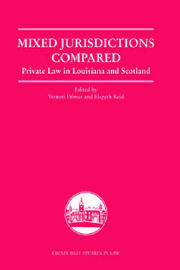Book contents
- Frontmatter
- Contents
- Preface
- List of Contributors
- List of Abbreviations
- Table of Cases
- 1 Praedial Servitudes
- 2 Title Conditions in Restraint of Trade
- 3 Servitudes: Extinction by Non-Use
- 4 Inheritance and the Surviving Spouse
- 5 Ownership of Trust Property in Scotland and Louisiana
- 6 The Legal Regulation of Adult Domestic Relationships
- 7 Impediments to Marriage in Scotland and Louisiana: An Historical-Comparative Investigation
- 8 Contracts of Intellectual Gratification – A Louisiana-Scotland Creation
- 9 The Effect of Unexpected Circumstances on Contracts in Scots and Louisiana Law
- 10 Hunting Promissory Estoppel
- 11 Unjustified Enrichment, Subsidiarity and Contract
- 12 Causation as an Element of Delict/Tort in Scots and Louisiana Law
- 13 Personality Rights: A Study in Difference
- Index
11 - Unjustified Enrichment, Subsidiarity and Contract
Published online by Cambridge University Press: 12 September 2012
- Frontmatter
- Contents
- Preface
- List of Contributors
- List of Abbreviations
- Table of Cases
- 1 Praedial Servitudes
- 2 Title Conditions in Restraint of Trade
- 3 Servitudes: Extinction by Non-Use
- 4 Inheritance and the Surviving Spouse
- 5 Ownership of Trust Property in Scotland and Louisiana
- 6 The Legal Regulation of Adult Domestic Relationships
- 7 Impediments to Marriage in Scotland and Louisiana: An Historical-Comparative Investigation
- 8 Contracts of Intellectual Gratification – A Louisiana-Scotland Creation
- 9 The Effect of Unexpected Circumstances on Contracts in Scots and Louisiana Law
- 10 Hunting Promissory Estoppel
- 11 Unjustified Enrichment, Subsidiarity and Contract
- 12 Causation as an Element of Delict/Tort in Scots and Louisiana Law
- 13 Personality Rights: A Study in Difference
- Index
Summary
INTRODUCTION
Until recently one could say with some confidence that acceptance of a general principle against unjustified enrichment was one of the hallmarks of a Civilian system of law. The emergence in Common Law systems of “unjust enrichment” as an important head within the law of obligations has qualified but not altogether eliminated the truth of the observation. Certainly one can still be sure that unjustified enrichment in mixed legal systems is an indicator of the Civilian rather than the Common Law dimension in their development, and that the current state of enrichment law in such systems is a bench-mark against which to test the strength or otherwise of that element in the modern mix. But one should not fall into the error of thinking that unjustified enrichment questions are approached in the same way in all Civilian systems. In a classic article published in the Tulane Law Review in 1962, the late Barry Nicholas distinguished between contemporary French and German approaches, noting that under the former the Code recognised only specific obligations to reverse enrichment in certain defined situations, while the BGB took the general principle as its starting point and developed a regime around that single concept. Although in France jurisprudence and doctrine had developed a general enrichment principle, its extra-codal character meant that it performed only a limited, gap-filling or subsidiary role; whereas in Germany there were no such limits, and the relationship between enrichment and other branches of the law was a matter for substantive and doctrinal analysis of their respective domains.
- Type
- Chapter
- Information
- Mixed Jurisdictions ComparedPrivate Law in Louisiana and Scotland, pp. 322 - 354Publisher: Edinburgh University PressPrint publication year: 2009



